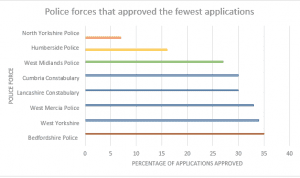A Freedom of Information (FOI) request undertaken by BBC News earlier this year, showed that around 50% of applications allowed under a review process (introduced in 2010 to allow people to apply to be removed from the sex offenders register) were successful. The same FOI request stated that approximately 700 people on the register had successfully applied to be removed from it over the past 4 years.
We thought this was interesting because, although there are many reasons why people are not successful, this was the first time we had seen figures that show the number that had been successful in their application to be removed from the register.
The Sexual Offences Act 2003 made anybody sentenced to more than 30 months in prison subject to indefinite notification requirements, without any opportunities for review.
However, in 2010, the Supreme Court ruled that under human rights laws, individuals should have the opportunity to prove that they are reformed and changes were made to allow individuals to seek a review after 15 years.
When the review process first came in, the Home Office issued guidance to all police forces which highlighted that before considering removing somebody from the register, officers should conduct a ‘robust review’ and be ‘satisfied that it is not necessary, for the purpose of protecting the public from the risk of sexual harm’ for a sex offender to continue to be on the register. However, one of the more surprising things to come out of the FOI was to show how police forces interpret the guidance very differently. For example, in North Wales 90% of requests to be removed from the register were successful whilst Dyfed-Powys did not approve any requests.


Dyfed-Powys and the City of London Police did not approve any requests
As the charts above show, although there appears to be a certain amount of disparity in how requests are dealt with, our advice to anybody with an indefinite notification requirement would be to request a review as soon as you are able to.
In you application, you will need to demonstrate:
- How the circumstances now, compared to those at the time of your offence, have changed meaning that you no longer pose any risk of reoffending.
- The way you behave now, compared to your behaviour at the time of your offence means that you no longer need to be subject to the notification requirements to manage any risk you pose.
You may also want to consider including some of the following:
- Details of positive relationships you’ve had with both adults and children.
- How you fill your time – if you’re employed, how long you’ve been in the same job and what other hobbies and interests you have.
- Details of any treatment programmes that you’ve attended which are relevant to your offence.
- Your attitude to your offence and how you make sure that you will not offend again.
- Any other information that you consider demonstrates that you no longer pose a risk.
If the police determine that your application should be refused, then you will continue to remain subject to indefinite notification requirements. You will be able to seek a further review after a minimum of 8 years has elapsed.
For more information
- For practical self-help information – More information on the review process is available in our information on convictions for sexual offences
- Questions – If you have any questions about this, you can contact theHelpline.
Learn more about this topic
- Parliamentary questions highlight the barriers facing many people with criminal records
- Proposed changes to social housing allocation may disqualify people with criminal records
- Creating connections: share your views
- Update on Unlock CEO recruitment
- Unlock’s training placement: reflecting on my time so far
Most popular articles from Unlock
- Take action for a fairer criminal records system
- Civil death, civic dignity: exploring dis/enfranchisement through art
- Prisoners to get Halifax bank accounts as they prepare for release
- A momentous day for tens of thousands of people with old and minor criminal records
- Moving on: Homelessness and leaving prison

Comments
Add Comment